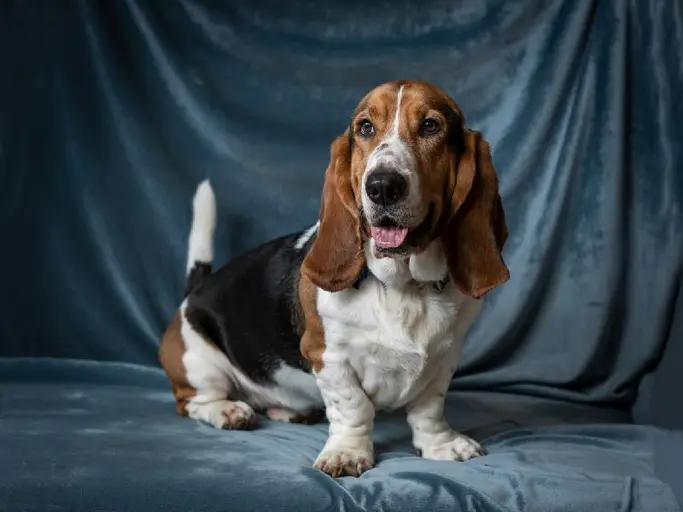Basset Hound: The Comprehensive Guide to the Lovable Low-Rider

Brief Introduction to the Basset Hound
The Basset Hound. Just the name conjures images of a low-slung, droopy-eared canine with an air of gentle melancholy. But don’t let their appearance fool you! These hounds are more than just a pretty (and wrinkly) face. They are affectionate, loyal, and surprisingly playful companions. Known for their exceptional sense of smell, Basset Hounds were originally bred for hunting, and retain a strong instinct to follow their noses. While they may not be the most energetic breed, their easygoing nature and comical antics make them a popular choice for families and individuals alike. They are also known to be extremely docile.
Breed History: From Abbey to America
Understanding the Basset Hound’s history helps to appreciate their unique traits. Their lineage can be traced back to France, specifically to the Abbey of Saint Hubert, where monks developed various breeds of scent hounds.
Origins in France
The ancestors of the Basset Hound were likely various French hounds, including the St. Hubert Hound, known for its exceptional tracking abilities. The term “basset” comes from the French word “bas,” meaning “low,” aptly describing the breed’s short legs. These low-slung hounds were prized for their ability to hunt small game on foot, allowing hunters to follow their progress easily through dense undergrowth.
Development and Refinement
Over centuries, various types of bassets were developed, each with slightly different characteristics. It wasn’t until the late 19th century that the modern Basset Hound began to take shape. Crossbreeding with other breeds, such as the Basset Artesien Normand, further refined their appearance and hunting skills.
Arrival in America
The Basset Hound made its way to America in the late 19th century, quickly gaining popularity as both a hunting dog and a companion animal. Their gentle nature and distinctive appearance made them a favorite at dog shows and in homes across the country. Today, the Basset Hound remains a beloved breed around the world.
Appearance: The Epitome of Hound Dog Charm
The Basset Hound’s appearance is instantly recognizable. From their melancholic eyes to their dragging ears, every feature contributes to their unique charm.
Size and Build
- Height: Typically measures between 12 to 15 inches (30 to 38 cm) at the shoulder.
- Weight: Usually ranges from 50 to 65 pounds (23 to 29 kg).
Their short legs and long body give them a distinctive “low-rider” appearance. Despite their relatively small size, they are surprisingly heavy and muscular.
Coat and Color
The Basset Hound boasts a short, smooth, and dense coat that is easy to care for. Acceptable colors include:
- Tri-color (black, tan, and white)
- Lemon and white
- Red and white
- Various other hound colors
Head and Facial Features
The Basset Hound’s head is perhaps their most defining feature.
- Ears: Long, velvety ears that hang well below their jawline. These ears are not just for show; they help to stir up scents from the ground as they track.
- Eyes: Deep-set, droopy eyes that often convey a look of sadness or contemplation.
- Wrinkles: The Basset Hound is blessed (or cursed, depending on your perspective!) with abundant wrinkles, particularly on their face and neck. These wrinkles are not only characteristic of the breed, but also serve a purpose, helping to trap scents as they hunt.
Tail
Their tail is carried high and with a slight curve. It should be strong at the base and taper to a point.
Character and Behavior: A Gentle Soul with a Nose for Trouble
Basset Hounds are known for their laid-back attitude and gentle disposition. However, there is more to their personality than meets the eye.
Attitude Towards People
Basset Hounds are generally friendly and affectionate towards people, including strangers. They are not typically aggressive or territorial, making them poor guard dogs. Their gentle nature makes them excellent family pets, particularly for families with children.
Relationship with Children
Basset Hounds are known to be patient and tolerant with children. They enjoy playtime and are generally good-natured around kids. However, as with any dog, it’s important to supervise interactions between Basset Hounds and young children to ensure everyone’s safety.
Interaction with Other Animals
Basset Hounds can get along well with other dogs, especially if they are raised together from puppyhood. Their pack animal instincts often lead them to enjoy the company of other canines. They may also tolerate cats, although their hunting instincts may occasionally kick in, requiring careful introductions and supervision.
Activity Level
While not high-energy dogs, Basset Hounds still require regular exercise. Daily walks are essential to prevent weight gain and maintain their physical and mental well-being. They are not particularly enthusiastic about running or playing fetch, but they enjoy leisurely strolls where they can follow interesting scents.
Trainability
Basset Hounds are intelligent dogs, but they can also be stubborn and independent thinkers. This can make training a challenge. Consistency, patience, and positive reinforcement methods are key to success. Food rewards can be a powerful motivator, but be mindful of their tendency to gain weight. Early socialization and obedience training are essential to ensure they develop into well-behaved companions.
Breed Characteristics
One of the most notable characteristics of the Basset Hound is their powerful sense of smell. Bred for tracking, they are naturally inclined to follow their noses, which can sometimes lead them astray. A securely fenced yard is crucial to prevent them from wandering off in pursuit of an enticing scent. Another common trait is their tendency to howl or bay, especially when they are bored or lonely.

Care and Maintenance: Keeping Your Basset Hound Happy and Healthy
Proper care and maintenance are essential to ensure your Basset Hound lives a long and healthy life.
Grooming
Basset Hounds require relatively little grooming. Their short coat is easy to care for, and weekly brushing is usually sufficient to remove loose hair and prevent matting. However, their long ears require special attention. Regular cleaning is essential to prevent ear infections, which they are prone to due to their poor air circulation. Wrinkles around their face also need to be cleaned regularly to prevent skin irritation. Bathe them as needed, typically every few months, or when they get particularly dirty.
Exercise
While not high-energy dogs, Basset Hounds still require regular exercise to maintain their physical and mental health. Daily walks of around 30 minutes are usually sufficient. Avoid strenuous exercise, especially in hot weather, as they are prone to overheating.
Feeding
Basset Hounds are prone to obesity, so it’s essential to carefully monitor their food intake. Feed them a high-quality dog food designed for their age and activity level. Avoid giving them too many treats, and resist those pleading eyes at the dinner table. Portion control is crucial to maintaining a healthy weight.
Health
Basset Hounds are generally healthy dogs, but they are prone to certain health problems.
- Ear infections: Their long, floppy ears make them susceptible to ear infections.
- Glaucoma and other eye conditions: Regular eye exams are vital.
- Bloat (Gastric Dilatation-Volvulus): A life-threatening condition where the stomach twists.
- Obesity: Manage their weight with portion control and exercise.
- Hip and elbow dysplasia: Screen breeders for these conditions.
- Intervertebral Disc Disease (IVDD): Their long backs predispose them to this issue. Avoid letting them jump from high places.
Regular veterinary checkups are essential to detect and treat any health problems early on.
Do Basset Hounds Need Haircuts?
No, Basset Hounds do not require haircuts. Their short coat is naturally low-maintenance. However, regular brushing helps to remove loose hair and keep their coat healthy.
Breed Weaknesses: The Downside of the Droop
While Basset Hounds are wonderful companions, they do have some potential weaknesses.
Level of Aggression
Basset Hounds are generally not aggressive dogs. They are typically friendly and tolerant towards people and other animals. However, like any dog, they can become aggressive if they feel threatened or provoked.
Loyalty
Basset Hounds are known to be loyal to their families. However, their independent nature and strong sense of smell can sometimes lead them to wander off in pursuit of an interesting scent. A securely fenced yard is essential to prevent them from getting lost.
Specific Weaknesses
- Stubbornness: Their independent nature can make training a challenge.
- Drooling: Basset Hounds are notorious droolers. Be prepared to wipe up after them!
- Howling/Baying: They can be quite vocal, especially when left alone or bored.
- Weight Gain: They are prone to obesity, requiring careful monitoring of their diet and exercise.
- Health Issues: As described above, they are prone to specific health issues.
Conclusion: Is the Basset Hound Right for You?
The Basset Hound is a unique and lovable breed that can make a wonderful companion for the right person or family. They are best suited for individuals or families who are looking for a calm and gentle dog with a low to moderate energy level. Basset Hounds thrive in homes where they are given plenty of attention and affection. They are relatively low-maintenance in terms of grooming, but require regular exercise and careful monitoring of their diet to prevent obesity. Their independent nature and tendency to follow their noses mean that they need a securely fenced yard and consistent training. If you are prepared to meet these needs, the Basset Hound can bring years of joy and laughter to your life. Just be prepared for the drool!
Frequently Asked Questions About Basset Hound
-
What is a Basset Hound known for?
Basset Hounds are known for their exceptional sense of smell, droopy ears, gentle nature, and comical antics. They were originally bred for hunting and retain a strong instinct to follow their noses.
-
Are Basset Hounds good family pets?
Yes, Basset Hounds are excellent family pets. They are generally friendly and affectionate towards people, including children. Their gentle nature makes them good companions for families.
-
How much exercise do Basset Hounds need?
Basset Hounds require regular exercise, but they are not high-energy dogs. Daily walks of around 30 minutes are usually sufficient to prevent weight gain and maintain their physical and mental well-being.
-
Are Basset Hounds easy to train?
Basset Hounds are intelligent but can be stubborn and independent thinkers, which can make training a challenge. Consistency, patience, and positive reinforcement methods are key to success. Food rewards can be a powerful motivator.
-
Do Basset Hounds drool a lot?
Yes, Basset Hounds are notorious droolers. Be prepared to wipe up after them!
-
What are common health problems for Basset Hounds?
Basset Hounds are prone to certain health problems, including ear infections, glaucoma and other eye conditions, bloat (Gastric Dilatation-Volvulus), obesity, hip and elbow dysplasia, and Intervertebral Disc Disease (IVDD).
-
Do Basset Hounds need haircuts?
No, Basset Hounds do not require haircuts. Their short coat is naturally low-maintenance. Regular brushing helps to remove loose hair and keep their coat healthy.
-
Are Basset Hounds aggressive?
Basset Hounds are generally not aggressive dogs. They are typically friendly and tolerant towards people and other animals. However, like any dog, they can become aggressive if they feel threatened or provoked.
-
Do Basset Hounds bark a lot?
They can be quite vocal, especially when left alone or bored. A secure fence is essential to prevent them from wandering off.
-
Why do Basset Hounds have long ears and wrinkles?
Their long, velvety ears help to stir up scents from the ground as they track. The wrinkles on their face and neck also serve a purpose, helping to trap scents as they hunt.

